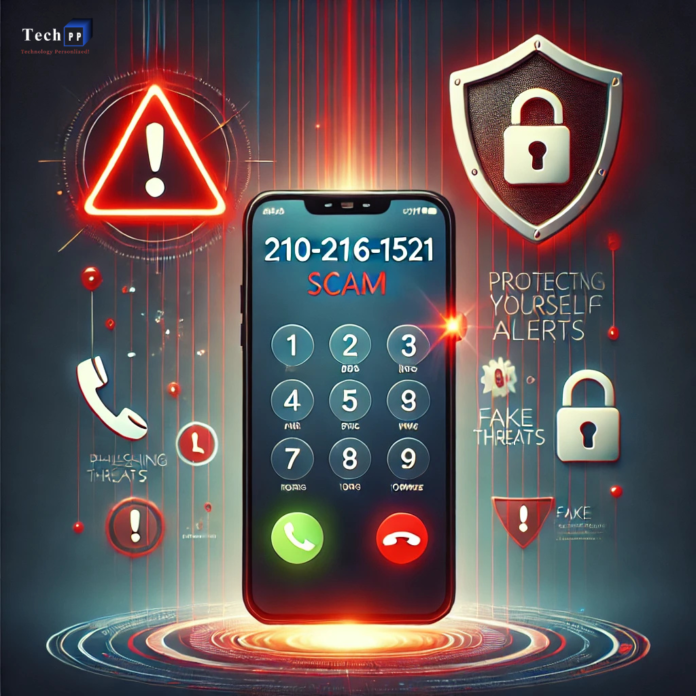It has been observed that the number 210-216-1521 is involved in scamming activities. In this scenario, fraudsters use this number to make a couple of non-existent phone calls to a specific target. In this context, one of the major concerns is how these scams work in the first place. Understanding the different types of scam methods is the beginning of the protection process.
How Scammers Use 210-216-1521
Most of the users of this number are fraudsters on the line of 210-216-1521. The main intention of using this number is to hide their real identity and engage in fraudulent activities such as scamming.
VoIP, on the other hand, allows scammers to conduct these operations without fear of legal repercussions. The caller ID can be spoofed, which allows them to set up another number or a well-known telephone number.
Consequently, the scam target assumes the caller is a local business, a government agency, or someone they already know.
These calls often involve fabricated emergencies, mock claims for prizes and even threats of a lawsuit. This appears to be successful, as the victims are coerced because of the concern or the rush created by the scammers.
Why 210-216-1521 is a Common Target
Most of the users picking up the calls do that because of a 210-216-1521 area code. Many times these numbers are created with a local area code or area code which can seem familiar.
Most victims of this type of call are people that do not know what a spoofing scheme is or have never heard of it. This method works for a number of financiers attempting to scam individuals.
Signs That a Call is Fraudulent
A scam call includes several indicators that could help you understand that the call is fraudulent and at the same time save you from being a victim. If you ever happen to receive a call from the number 210-216-1521, here are some things to keep in mind:
- Unanticipated Calls: Unless you were expecting a phone call, be cautious about divulging any information.
- Asking for Personal Information: Respectable businesses do not and should not request for sensitive or financial information through calls.
- Coercive or Threatening: Scammers are known to be bullies, making intimidating threats to clients including threats of arrest.
How to Keep Yourself Safe
If you want to avoid scams involving the number 210-216-1521, here are some steps you should take:
- Don’t Pick Up Numbers: If you do not recognize the number or it is not in your contacts, simply ignore the call and let it go to voicemail.
- Ask for Verification: If the caller claims to work for an organization, simply hang up and call the company you are supposedly in contact with using a number you know and trust.
- Tools For Blocking Calls: Several smartphones and applications that are obtained from outside can eliminate contacting suspected spam calls.
What to Do If You Receive a Scam Call
It is wise not to work with a caller you suspect is calling from 210-216-1521. Do not provide your payment details or any personal information to them. While potential action can be contemplated, this can also end by immediately hanging up the phone.
- Report the Call: Lodge a complaint with your phone service provider, or any other agency you know of like the Federal Trade Commission (FTC).
- Block the Number: You can easily block a number on your cell phone. In this case, any future attempts calling from 210-216-1521 will be futile.
- Educate Others: You can make them aware of your encounter with the scam so that they secure themselves from such frauds as well.
How to Recover If You’ve Been Scammed
After being on the receiving end of a scam call from 210-216-1521, there are still steps you can take to reduce the everlasting consequences that can arise from the situation:
- Notify Financial Institutions: In case you provided your sensitive details in any of your communications, the first step is to contact the bank where you hold your account.
- Change Passwords: Start changing passwords for all accounts that may have been compromised.
- Monitor Your Credit: Cross-check your credit reports to spot any erroneous activity or accounts opened without your consent.
Reporting a Scammer’s Call
It’s a vital step in fighting fraud to report a scam call. In case you received a call from 210-216-1521, then you can register a complaint with agencies such as the FTC or the Federal Communications Commission (FCC).
Also, notify your telecommunication service provider so that they can take steps to prevent this number from getting through to their network.
Questions Related to 210-216-1521 Threatening Calls
Q1. What is the 210-216-1521 Scam?
A: The 210-216-1521 scam is perpetrated by fraud utilizing this number to call victims using voice spoofing. Several impersonate legitimate businesses in order to get private and sensitive information or cash out of the target.
Q2. How do I know if the call from 210-216-1521 is fake?
A: Unsolicited calls are among the signs to watch out for. High-pressure sales tactics, requesting for non-related personal information, and extreme or out of the ordinary modes of payment such as gift cards.
Q3. A call is coming from 210-216-1521, what should I do?
A: Do not answer calls from unknown numbers. However, if you have done so and feel that the call is a scam, cut off the call without giving any details out.
Q4. Is it possible to block the 210-216-1521 number?
A: It is possible, using phone settings or call-blocking apps to set aside that number. This action should help hinder more scams from occurring.
Q5: Is there a way to report spoofed call from number 210-216-1521?
A: Both the FCC and FTC allows a person to report such calls. It is also a good idea to inform your phone carrier about it.
Q6: I believe I’ve been a victim of ID Theft while on the call with 210-216-1521. How can I resolve this issue?
A: Well, first and foremost, it is important to explain the situation to your bank or the credit card carrier so that the person cannot breach anymore details. However, it is also a good idea to change your passwords on all the accounts that have been breached or freeze the credit.
Q7: Is there a guarantee that I will not lose any money if call from 210-216-1521 comes through?
A: This isn’t the case. Scammers often use gullible people’s nicknames when calling, which is why there are a lot of known people’s numbers that are calling from a spoofed number instead making it difficult to track them down.
Q8: Is there a way that a person can avoid these calls?
A: One can use call blockers, not receive calls from unknown numbers, and keep an up-to-date knowledge about the latest scam practices. The one thing to always do is make sure that random calls that were not solicited are real.
Q9: Considering other factors are still in the mix is there a way a company can guarantee me that these types of calls won’t reach me again?
A: We all know that stopping these types of scam calls entirely is difficult however there are a couple of things that can be done to at least prevent them in the first place such as informing authorities or just simply not picking up and calling back random numbers.
Q10: Considering that I do not have much experience with scams can you explain to me why they call so frequently from numbers like 210-216-1521?
A: When people do this it increases the chances of people answering the calls which in turn makes it much easier for the scams to execute.
Why It Is Important To Alert Yourself
Frauds such as those relating to 210-216-1521 operate on the basis of ignorance and fear. Knowing these methods can help you save yourself and your family safer. Always being alert and cognizant of factors is the best winning method.
Conclusion:
Fraudsters use numbers such as 210-216-1521 and other numbers that appear to be registered to major companies as call centers and business numbers. It is a common problem but with proper awareness and some precautionary measures from you, you are unlikely to be one of their victims.
Take this information and direct it to your friends and family for greater help. The first step to protecting yourself is to determine what the risks are and how to mitigate them.


